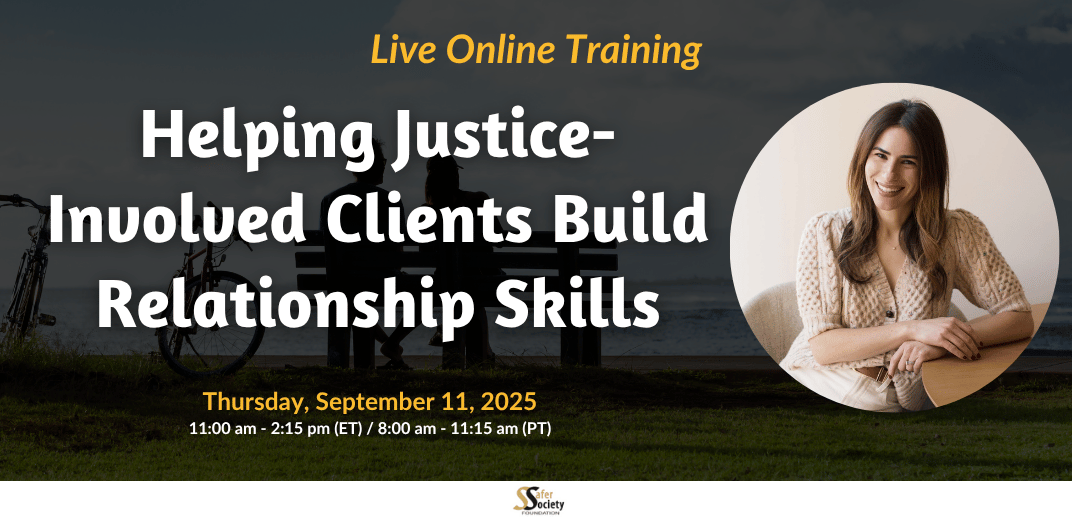
Helping Justice-Involved Clients Build Relationship Skills
Please note: This training is not eligible for CE credits.
Each registration includes a certificate for attendance. To be eligible for a certificate, you must attend the entire live training and complete an evaluation form within 24 hours following the live event.

Reentering society after incarceration is a complex process, particularly for justice-involved individuals with histories of sexual offending, intimate partner violence, or other behaviors that place them at risk of perpetrating harm. Professionals in the field play a crucial role in supporting these individuals as they work to rebuild trust, connection, and healthy relationships. Grounded in relational, trauma-informed, and accountability-centered frameworks, this training offers participants a compassionate approach to working with justice-involved clients and the crucial skills that help prevent further harmful behavior.
Through a blend of psychoeducation, interactive discussion, and hands-on skill-building, presenter Landis Bejar, LMHC-D, LPC, guides participants in accompanying clients in an exploration of boundary setting, consent, attachment dynamics, shame resilience, and the impact of social stigma on relational development. Special attention is given to navigating dating, disclosure, and emotional vulnerability in ways that prioritize both client safety and community responsibility.
Bejar also addresses the internalized narratives that justice-involved individuals may carry about themselves as partners or community members—narratives that often interfere with their capacity for intimacy and connection.
Interactive Follow-Up Meeting
Attendees are invited to join an open discussion 15 minutes following the end of the training, where you can engage with fellow attendees by turning on your camera and microphone. This is an opportunity to share your experiences and contribute to a meaningful exchange of ideas. Time will be allocated to address questions or insights from the training. Please note that attendance is optional and will not affect your eligibility for a training certificate.
1) Identify key relational and psychological challenges that justice-involved individuals face during reintegration, particularly in social and romantic contexts.
2) Apply trauma-informed and accountability-centered clinical strategies to support clients in building safe, respectful, and consensual relationships.
3) Demonstrate core healthy relationship skills—including setting boundaries, communicating effectively, regulating emotions, and navigating vulnerability—to clients who may lack previous models of safe and supportive partnership.
4) Express client support in exploring their self-concept and identity reconstruction, with an emphasis on reducing shame and fostering self-awareness, self-respect, and relational integrity.
5) Describe the practical and emotional complexities of dating post-incarceration, including decision-making, disclosure, consent, rejection resilience, and developing respectful approaches to initiating and sustaining connection.
Audience
This training is for professionals working with people who have harmed others and/or have been perceived as not amenable to treatment. Professionals who will benefit from this training include social workers, psychologists, clinical counselors, and interested paraprofessionals.
Content Level
Cancellations
Who's Presenting

Landis Bejar, LMHC-D, LPC
Landis Bejar, LMHC-D, LPC, is a licensed psychotherapist and founder of AisleTalk, a group practice dedicated to helping individuals build healthy, connected relationships through life’s most emotionally charged transitions. With over a decade of experience in community mental health, school-based services, and private practice, she has supported clients navigating trauma, systemic barriers, and complex relational stress. Her work spans crisis intervention, individual, couples, family, and group therapy, with a focus on identity development and relational healing after harm or disconnection. Landis brings a culturally humble, accountability-centered, trauma-informed, neuro-affirming, and relational lens to her clinical work, supervision, and trainings—helping clinicians, caretakers, and clients foster shame resilience and emotional safety in meaningful relationships. She draws on postgraduate training in Emotionally Focused Therapy (EFT), the Gottman Method, and Cognitive Behavioral Therapy (CBT). Landis holds a bachelor’s degree in Family and Child Sciences from Florida State University and dual master’s degrees from Columbia University. She is licensed in New York, Georgia, and Florida.
